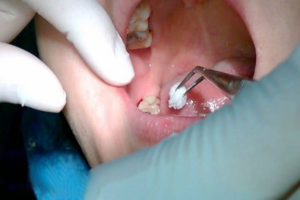Is wisdom tooth extraction painful? This is a common concern for many people facing the decision to remove their wisdom teeth. The procedure can indeed cause discomfort, but the level of pain varies depending on several factors. If you are wondering about this issue, let’s explore it further with Joy International Dental Clinic in the article below.
1. Does Wisdom Tooth Extraction Hurt?

It is undeniable that wisdom tooth extraction can cause pain. However, the intensity of pain varies from person to person, depending on their pain tolerance and physical condition. But there’s no need to worry too much! Before the procedure, the dentist will administer local anesthesia, ensuring you do not feel any pain during the extraction.
Of course, once the anesthesia wears off, you may experience mild to moderate pain, depending on your dental condition and individual tolerance. However, by following the doctor’s post-extraction care instructions properly, you can significantly reduce any discomfort and accelerate healing.
2. Why Does Wisdom Tooth Extraction Cause Pain?
Wisdom tooth extraction is a minor surgical procedure that directly impacts the gums and jawbone, which can lead to discomfort. The level of pain experienced depends on several factors, including:
2.1 Pain Tolerance Varies Among Individuals

Each person has a different pain threshold. Some people may only experience slight sensitivity, while others feel prolonged discomfort. Additionally, the healing process varies from person to person. Some individuals heal quickly, leading to a shorter duration of pain, whereas others may take longer to recover.
2.2 The Condition of Your Teeth
If your wisdom teeth grow straight and are not impacted, the extraction process will be simpler and less painful. However, if your teeth are misaligned, impacted, or infected, the procedure becomes more complex, leading to increased discomfort and a longer healing period.
2.3 The Dentist’s Skill and Experience

Choosing a skilled and experienced dentist is crucial. A highly trained professional can perform the extraction gently and efficiently, minimizing damage to surrounding tissues and reducing post-extraction pain. In contrast, an inexperienced dentist may cause unnecessary trauma, leading to prolonged pain and complications.
2.4 The Surgical Technology Used
With advancements in dental technology, wisdom tooth extraction can now be performed using modern techniques such as Piezotome ultrasonic devices or laser-assisted procedures. These methods significantly reduce pain and minimize damage to soft tissues compared to traditional techniques that use forceps and scalpels. Consequently, newer technologies contribute to faster healing and less post-operative discomfort.
2.5 Post-Extraction Care
Proper aftercare plays a vital role in pain management and recovery. If you follow your dentist’s instructions regarding oral hygiene, diet, and medication use, you can minimize pain and speed up healing. However, neglecting proper aftercare can lead to infection, prolonged pain, and other complications.
3. How to Reduce Pain After Wisdom Tooth Extraction
To alleviate pain and promote a faster recovery after wisdom tooth extraction, you can apply the following methods:
3.1 Cold Compress Therapy

Applying a cold compress to the affected area is an effective and affordable way to reduce pain and swelling. You can place an ice pack on the outside of your cheek near the extraction site for 15-20 minutes every hour during the first 24 hours. The cold helps constrict blood vessels, reducing blood flow to the area and minimizing swelling and inflammation.
3.2 Taking Pain Medication
Your dentist will likely prescribe pain relievers such as ibuprofen or acetaminophen to help manage discomfort after the procedure. Be sure to follow the prescribed dosage and avoid overuse, as excessive medication can lead to unwanted side effects. If the pain persists despite taking medication, consult your dentist immediately for further evaluation and treatment.
3.3 Practicing Proper Oral Hygiene

After the extraction, avoid rinsing your mouth too vigorously within the first 24 hours to prevent dislodging the blood clot that forms at the extraction site. From the second day onward, you can rinse your mouth gently with saline solution to keep the wound clean and reduce the risk of infection. Additionally, be cautious when brushing your teeth—use a soft-bristled toothbrush and avoid direct contact with the surgical site.
Conclusion
So, does wisdom tooth extraction hurt? The answer depends on several factors, including individual pain tolerance, the condition of your teeth, the dentist’s expertise, the technology used, and post-operative care. However, thanks to advancements in modern dentistry and effective pain management techniques, wisdom tooth extraction is no longer as daunting as it once was.
At Joy International Dental Clinic, we are committed to providing top-quality dental care, ensuring a safe and comfortable experience for every patient. If you have concerns about wisdom tooth extraction, do not hesitate to consult our experienced dentists for personalized advice and treatment!






